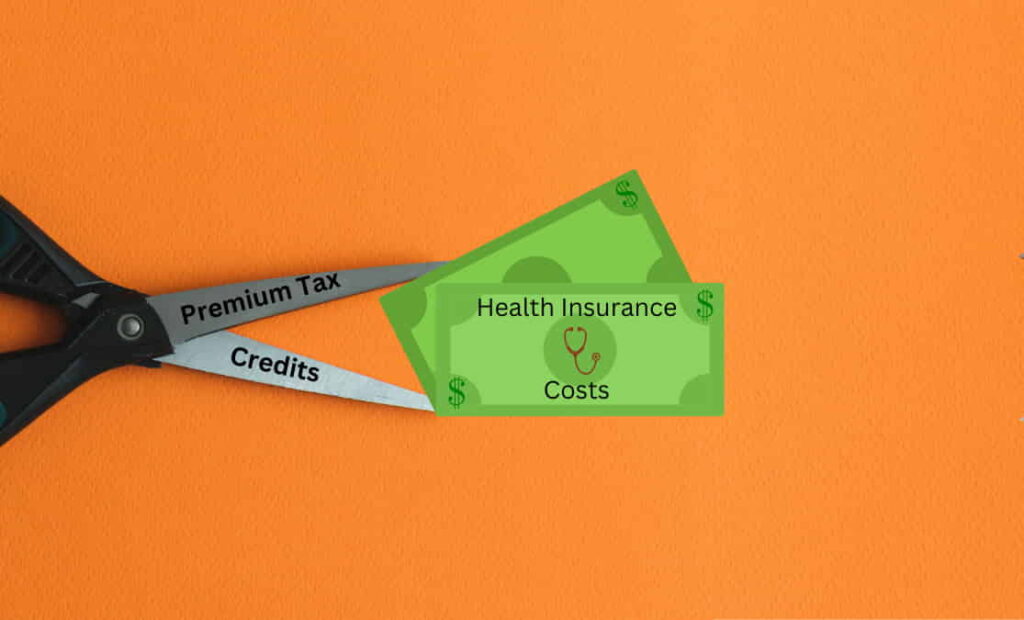Early Retirees: How to Qualify for Premium Tax Credits

Why Worry About Premium Tax Credits?
Table of Contents
For those who have FIRED and are less than 65 years old, affordable health insurance is a major concern, and for people considering early retirement, affordable health insurance is the number one obstacle between them and retirement.
Many early retirees are surprised to learn that they can qualify for premium tax credits (PTCs) which make The Affordable Care Act (ACA) plans a good health insurance choice. These PTCs can be as much as $1000 a month and for many retirees can nearly or totally eliminate monthly health insurance premium payments.
Age 65
Why is the age 65 so important? In general, individuals become eligible for Medicare when they turn 65, and become ineligible for ACA insurance coverage.
ACA Income Thresholds
To be eligible for ACA insurance coverage in 2025, individuals must have a minimum income of $15,060, and couples $20,440.
The maximum allowable individual income for 2025 to receive PTC’s is $60,240, and for couples is $81,760. You cannot file married filing separately and claim PTC’s.
There is a PTC calculator at KFF.org that you can use to estimate your PTCs for 2025. It’s interesting to play around with income figures and see just how much modifying your MAGI affects PTCs.
An Example From the Calculator:
A single woman in Denver, Colorado, aged 59 is considering retiring in December 2024 and going on ACA in 2025. She estimates her income from her rental property to be $2000 a month and then interest and dividends to be $10,000 annually. If she needs more cash she may or may not take an IRA distribution when she reaches 59 1/2.
Per the PTC calculator her cost for a silver plan after PTCs will be $86 a month!
If she decides to take a $10,000 taxable IRA distribution her cost for a silver plan will be $209, costing her $1476 more of the year.
Regulating income, taxable, and non-taxable retirement withdrawals is a balancing act!
Income above 400% of the Poverty Level
Early retirees earning above 400% of the poverty level in 2025 are still eligible for ACA coverage and may qualify for Premium Tax Credits under the “Enhanced subsidies “ portion of the ACA where premiums are capped at 8.5% of income. Retirees with earnings over 400% of the poverty level don’t need to fear the “income cliff” where subsidies plummet or are eliminated as one crosses the 400% poverty level threshold.
It should be noted that the “enhanced subsidies” are set to expire at the end of 2025 if not renewed, which could return the “cliff”
What If Your Income isn’t Within this Range?
If you don’t qualify for premium tax credits because your income isn’t within the required range, you can use strategies to manipulate your income so that it falls within the desired range.
What Year’s Income Is Used to Determine ACA Eligibility?
If you are applying for 2025 coverage, your 2025 income will be the income year used to determine eligibility.
When you apply for coverage you will estimate your 2025 income. Healthcare.gov will determine your eligibility and PTC’s based on your income estimates. Most people opt to use the PTC’s to lower their monthly premiums but you can choose to pay the full premium and claim the PTC when you file your tax return.
What Income Figure Do I Use?
When determining eligibility you need to calculate “MAGI”- Modified Adjusted Gross Income.
To calculate MAGI you will use the following calculation:
Take adjusted gross income from your tax return and add the following:
Non- taxable social security benefits
Tax-exempt interest
Untaxed foreign-earned income
Here is a Magi Calculator that should help you with the calculation: :https://www.omnicalculator.com/finance/magi
Reconciling Income and Credits

When preparing your 2025 income tax return you will complete Form 8962 using your 2025 actual MAGI and the form 8995 that you’ll receive, to calculate your PTC and then reconcile it with the advance PTC you received.
If your income is more than you estimated you may have to pay back all or a portion of the PTCs received through the year. If your income is less than estimated you may qualify for additional PTCs which you will claim on your tax return.
It Pays to Monitor Income
When on Healthcare.gov insurance It’s important to estimate your income as accurately as possible and then monitor your income throughout the course of the year. Failing to do so can result in some ugly surprises.
Should your income stray significantly from your initial income estimates, you should update your information on Healthcare.gov which more than likely will result in an adjustment to your monthly payments.
Income Monitoring Tools
Some good programs/apps to facilitate tracking income are:
Which program or app is best? The one that is easiest for you to use and makes sense to you is the one you should choose. It’s a matter of personal preference. I recommend looking at each of the programs/apps and seeing which is most intuitive to you.
These programs/apps all track your income and spending via links to your accounts, making monitoring income a cinch.
Help-My Income Estimates Are Way Off
Sometimes life just happens and your estimated income ends up being way off. Perhaps you experience an unexpected windfall and income is increased or on the other end of the spectrum, your spouse decides they want to join you in retirement and their anticipated salary disappears.
Is all lost? Not at all, there are techniques to manage income.
Techniques to Manage Income

Fired individuals need to be conscious of their income for the upcoming year and strategize how to minimize taxable income to maximize PTCs.
Unlike wage earners, retired people have many options to control their taxable income.
Some of the more common techniques for minimizing taxable income but providing sufficient cash flow to pay your expenses include
Cash Reserves
Many early retirees have a 3-4-year cash reserve in case of a market turndown. Utilizing this cash reserve for expenses can significantly reduce the need for other income.
ROTH IRA Distributions
Withdrawing the basis from your ROTH is a non-taxable event.
If you are over 59.5 you can also take ROTH income distributions without tax or penalty.
Stock Sales
Selling stocks from your taxable brokerage account, that have little or no appreciation can be a good cash source. You can also sell stocks that have lost money to offset gains and or /take up to a $3000 capital loss deduction.
HSA Contributions
If you enroll in an HSA-eligible insurance plan you can make a deductible HSA contribution. For 2025 the individual HSA contribution limit is $4,300 and $8,550 for families. Add $1,000 to these limits if you are 55 or over.
Divest Dividends from Your Taxable Portfolio
Dividends can easily push you over the ACA income threshold. Review your taxable portfolio and if you have holdings paying high dividends sell them and replace them with growth stocks/funds. Income from growth funds is much easier to control.
Treasury Zeros
Zero coupon bonds or treasury zeros are bonds which are purchased at a discount to their face value. When they mature the income is realized. You can purchase treasury zeros with a maturity date after you turn 65.
HSA Reimbursements
You can opt not to reimburse yourself for HSA-eligible medical expenses each year, and choose to let your HSA benefit from tax-free growth. If you need a little extra cashflow after retirement you can reimburse yourself at that time for these expenses.
Side Hustles
Side hustles can be useful when trying to minimize income. You can create losses by purchasing and writing off assets.
Minimum Income Threshold
It also bears mentioning that you need a minimum amount of income to be eligible for ACA coverage ( if minimum income is not met you can fall into Medicaid or worse the Medicaid expansion crack in states that didn’t expand Medicaid coverage). Some early retirees’ retirement strategies provide for living off cash reserves only until they are 65 so they will need to generate income sufficient to meet the minimum income threshold.
Ways of generating income include:
ROTH Conversions
Converting traditional IRAs or 401K’s to ROTH IRAs is taxable and increases your MAGI for ACA purposes.
Stock Sales
You can sell appreciated stocks in your taxable brokerage account to create income. You can then repurchase the stocks.
Retirement Distributions
You can take a distribution from your traditional IRA or 401(k) to boost income.
Dividend Stocks
Investing in dividend stocks rather than growth stocks will produce more income.
Income Too High to Qualify for Premium Tax Credits
Some retirees who need or have more taxable income than allowed for PTCs may opt to qualify for ACA tax credits every second year.
For example, if you have large unrealized capital gains in a taxable account you may want to take advantage of low capital gain rates and trigger gains. These gains may put you over PTC income thresholds.
One strategy is to take gains every second year and minimize taxable income in the intervening years. In 2025 a single person with no other income can take up to $48350 in gains, and a married couple up to $96,500 and not pay any income tax.
Other Considerations For ACA Planning
Early Social Security
Taking early social security will affect your MAGI even though it might not increase your taxable income. Consider its impact before starting to draw on it.
ROTH Conversions
Those who want to do ROTH Conversions may have to choose between receiving PTCs now and paying income taxes in the future.
For those born after 1960 required minimum distributions don’t kick in until age 75, so you have 10 years from when you qualify for Medicare to undertake ROTH conversions without worrying about losing PTCs.
Enrollment Period
The normal enrollment period for ACA coverage is November 1 to January 15th. However, there are Special Enrollment Periods that open if you lose your employer-provided coverage,
No One Size Fits All
Everyone has different income and medical needs. It’s up to you and your financial advisor to come up with the optimum insurance scenario that fits you best.
Other Healthcare Options
Affordable Care coverage is not your only healthcare option. In my post Retirement Healthcare Options for Early Retirees I discuss some healthcare alternatives that just might be a better fit for you and your family.






6 Comments
Pantea
This is SUCH a helpful article since my partner and I are planning on retiring early. Thanks for breaking everything down and providing helpful resources and ideas.
Carolyn
I hope you can retire early. It’s amazing the snowball effect of starting down the path to early retirement.
Jarrod
It’s always good to learn, but I’m still a long way from retirement. Roth IRAs and long-term mutual funds are for me. Hopefully, in 30 years, I’ll have enough to retire!
Carolyn
Good for you for starting the journey with ROTH’s. You never know with diligent saving you may retire far sooner than in 30 years!
Lauren Maker
Wow, valuable advise! Although I don’t want to ever retire! I’m terrified of it! Getting old sucks!
Carolyn
Haha…getting old may suck but it’s better than the alternative! Retirement is actually a whole lot of fun!